Advertisement
Same Sisters, Waaay Different Dialogue In Millennial Re-Imagining Of Chekhov's Classic
Resume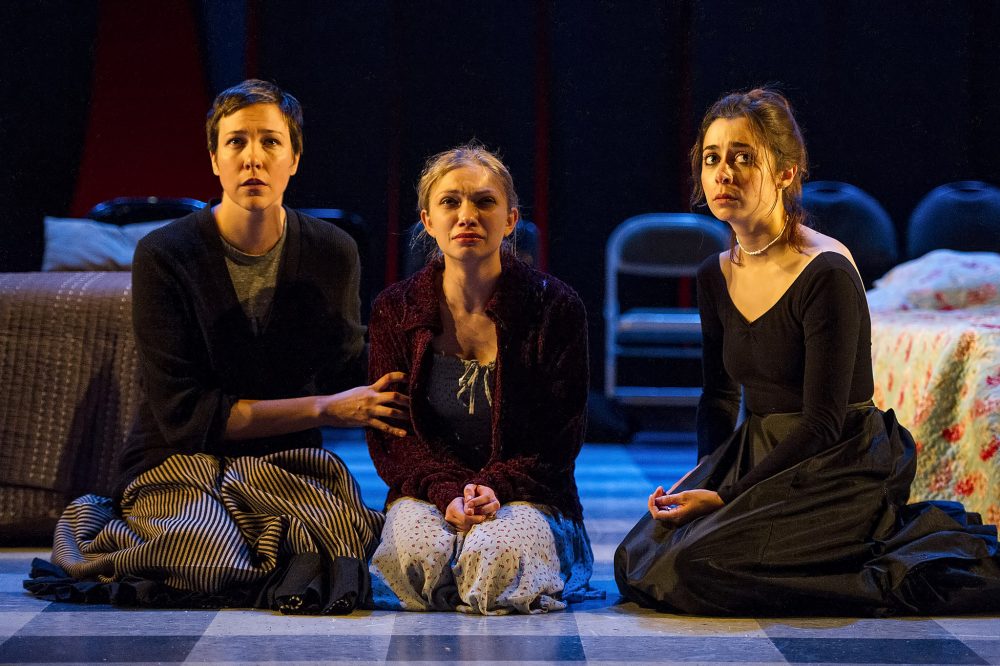
OMG, WTF and dope are terms not usually heard in a play by Anton Chekhov. But modern slang, expletives and blue humor fill a re-imagining of "Three Sisters," the Russian writer's classic tale of existential unrest and bougie ennui.
The bawdy update also has a new title: "Moscow Moscow Moscow Moscow Moscow Moscow," which is premiering at the Williamstown Theatre Festival through Aug. 6.
At a recent rehearsal in an elementary school performance room, award-winning director Trip Cullman works with actors on a scene that contains not one but three annoyed "uchhhhhs."
Periodically, 32-year-old playwright Halley Feiffer bursts out laughing from her seat at the production table. She chimes in with different ideas and wording for the developing script. "What's funnier?" Feiffer asks the group, more than a few times.
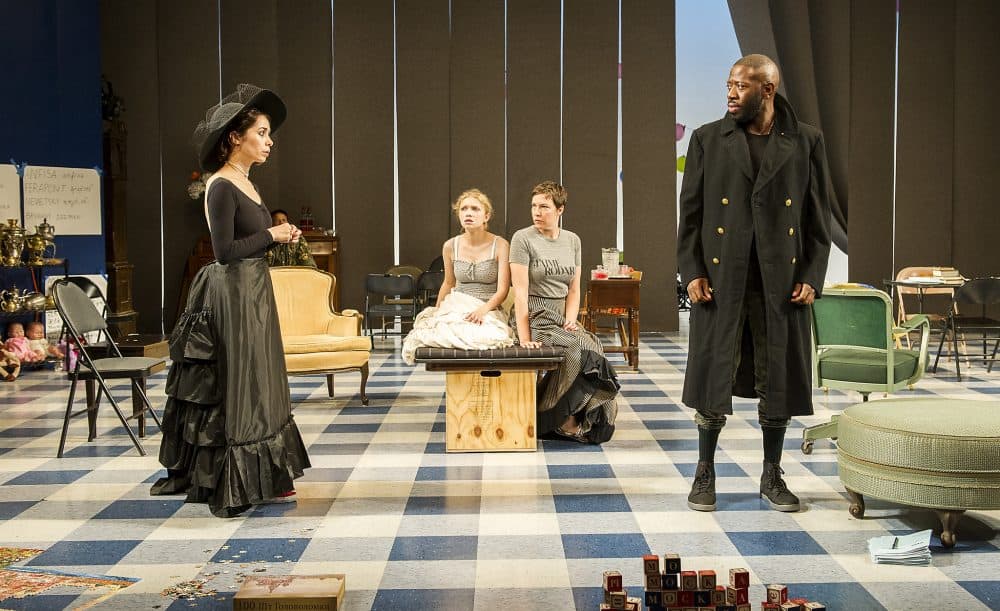
“When Halley first told me about her notion to adapt Chekhov's 'Three Sisters' and make everyone sound like millennials I thought she was insane,” Cullman tells me after rehearsal.
For him and a lot of theater geeks, “Three Sisters” is like a Holy Grail.
The plots in both Chekhov and Feiffer’s versions follow three privileged, 20-something siblings in the Russian countryside, around the year 1900. Their parents have passed, they're fumbling to find their footing and they’re desperate to get back to the big city — to Moscow. What starkly distinguishes the new telling from the original — as you've surmised by now — is the language.
In a scene from a more traditional production — like this one filmed by the BBC — the actors deliver Chekhov’s refined dialogue and layered subtext with ephemeral hints and mannerly aplomb.
"You look lovely today. Really, most attractive. Masha looks pretty today, too," the sisters say to each other.
Here's the full version of the BBC's production:
In Feiffer’s re-imagining of that same scene is more evocative of the Kardashians.
"You look dope as hell Irina, you’re wearing a cute white dress and you look just sick," says Rebecca Henderson, who plays Olga. "And Masha, you look super fly, too, but you already know how hot you are."
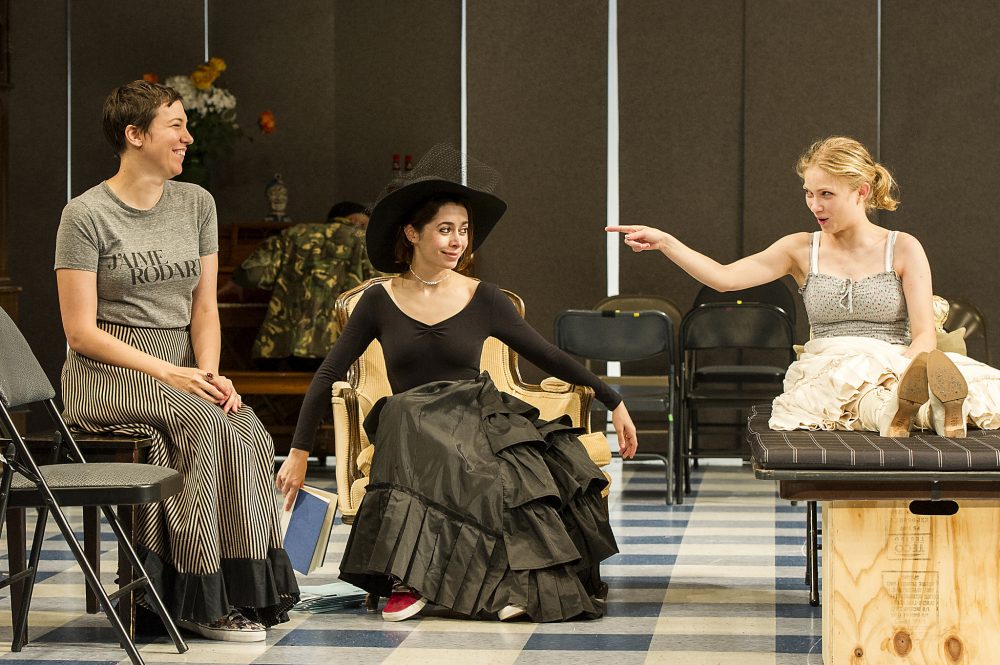
For Cullman, the contemporary language makes something that might feel musty feel immediate. While the over-the-top characters seem vapid, he says they talk the way a lot of us do these days.
“They're all talking and dancing and laughing and cursing and word vomiting, in a desperate attempt to stave off existential despair,” Cullman explains, “because if they stop spinning like a top they would realize that their lives are meaningless and hopeless.”
At one point, Baron Tuzenbach — one of the characters who hang around the three sisters' crib asks, "So what’s going on?" then quickly answers himself: “Trick question, since literally nothing ever goes on here! Am I right? Where do I think we are, Moscow?"
“This is an homage to the play — this is not an F-you to the play,” Feiffer assures me. “It's the opposite.”
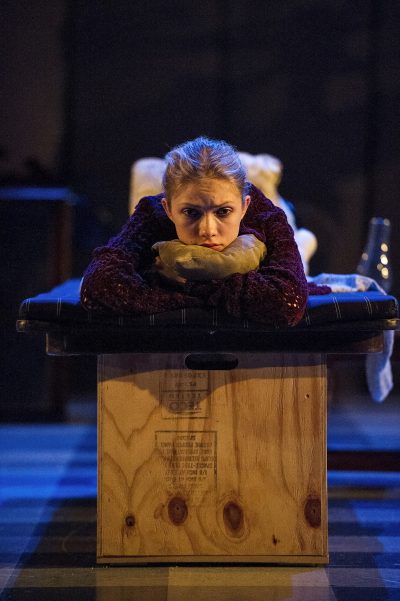
Feiffer's first experience with "Three Sisters" was in high school — and, at first, she hated the play. She was playing Natasha, and eventually her drama teacher showed her how to unpack the play's layers of meaning.
"Working on it has made me fall in love with the play more and more every day," she says.
Feiffer is the daughter of humorist Jenny Allen and screenwriter, playwright and cartoonist Jules Feiffer, so words, performance and theatricality are major components of her DNA.
Halley Feiffer’s previous plays are originals, but now she’s exploring the beloved, 117-year-old text through her own lens.
"A lot of it sounds sort of 'millennial,' " she says. "But that's not because these characters are stupid, and it's not because I'm a writer who is trying to be cute."
The characters lean on a "heightened, stylized way [of talking] as a means to avoid being intimate with each other — and honest with themselves — and present in their lives,” Feiffer says.
Feiffer hopes to shed light on truths she hasn’t seen in other interpretations. She also wants “Moscow Moscow Moscow Moscow Moscow Moscow” to be funny since Chekhov himself deemed the play a comedy. "I believe comedy makes poignant moments more tragic," Feiffer adds.
“All these characters do is talk about how they want to go to Moscow when the truth is they could very easily go to Moscow, so they don't really want to go to Moscow,” Feiffer muses. “They really want to talk about how they don't want to be where they are. And that's something that I can relate to.”
Feiffer and the cast and crew suspect a lot of other people can, too.
“That's why the play is called Moscow six times,” Feiffer continues. “Because it's not just Moscow. It does mean Moscow, and it also means that boyfriend, the sex I'm not getting, the sex I'm getting but different, a different husband, a different job, a different pay check, a different house. It doesn't matter.”
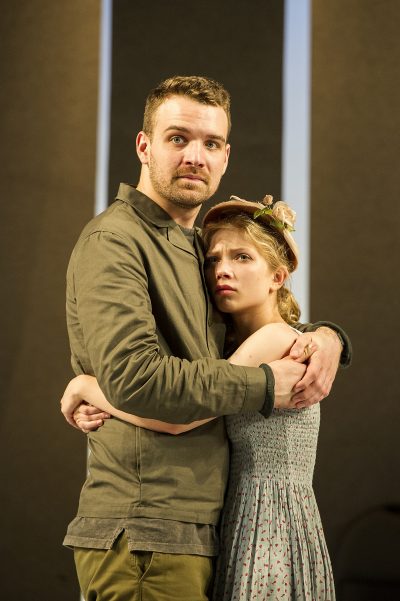
Twenty-eight-year-old actor Micah Stock, who plays Baron Tuzenbach in Feiffer's adaptation, concurs, saying that unfulfilled longing and angst are eternal.
“It's the plight of every generation. It was the plight of people in the Russian countryside in early 1900s, the same way that it is of millennials in Western Massachusetts in 2017," Stock says. "We just haven't come as far as we think we have.”
Stock knows the playwright well and says he finds her fascination for the rollicking script throughout the adaptation.
“As crude as it as it sounds, as profane as it may be, her love for these people and for the original text are still very much there," he says. "But she also doesn't feel the need to be reverential, and that is such a blast as an actor to have something that you can both honor and sort of blow apart at the same time."
The adaptation of the play questions our culture's favorite punching bag: millennials. Stock says his generation is criticized a lot for not working hard enough and being entitled.
"I think in some ways this play is an opportunity to say, 'Perhaps that's true of some of these people, but they're still fighting for something, and that doesn't make them less human,' " he says.
Feiffer says she had her own Moscow for a while — Los Angeles — until she actually moved there.
“For the first week there I was like, 'I'm the best me I've ever been!' And then a week later I'm like, ‘Oh, I'm just me still — and I still have the same problems, and the same thought patterns, and the same joys, and I'm always just going to be me — for better or worse.”
The young playwright is well-aware that Chekhov purists could have strong reactions to her re-imagining.
“If they hate it, that's OK,” she says with a laugh. “If they're repulsed, or offended, or if they hate me, that's fine. I just don't want anyone to ever be bored.”
As for what Chekhov himself would think?
Director Trip Cullman says: “I think he would so dig it, I really do.”
This article was originally published on August 02, 2017.
This segment aired on August 2, 2017.

